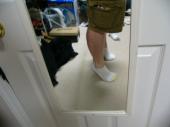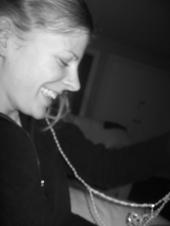
JC Courtoy
Social
Relationship Status
Single
Highschool
Oakland High School
Interests
Books. Music, Poetry (Good ones).
Favorite Music
Vertical Horizon
Favorite Books
Miracles by C. S. Lewis
A Grief Observed - C. S. Lewis
July 28 2006
As his step son said, "A Gieft Observed is not an ordinary book. In a sense it is not a book at all; it is, rather, the passionate result of a brave man turning to face his agony and examine it in order that he might further understand what is required of us in living this life in which we have to expect the pain and sorrow of the loss of those whome we love. It is true to say that very few men could have written this book, and even truer to say that even fewer men would have written this book even if they could, fewer still would have published it even if they had written it."
That is very true and for yal, this book helps a lot for any who feel a loss of any kind greatness or smallness. We all need help sometimes, no matter how big or small. Anything would help to understand and acknowledge how we feel ;or how to resolve ,or more rather help to soothe the situation or feeling to a barebility ( the ability to bare something, may have spelled it wrong if its not a word well its a new one lol.)
"No one ever told me that grief felt so like fear. I am not afraid,but the sensation is like being afraid. The same fluttering in thestomach, the same restlessness, the yawning. I keep on swallowing.
At other times it feels like being mildly drunk, or concussed. There is a sort of invisible blanket between the world and me. I find it hard to take in what anyone says. Or perhaps, hard to want to take it in. It is so uninteresting. Yet I want the others to be about me. I dread the moments when the house is empty. If only they would talk to one another and not to me.
There are moments, most unexpectedly, when something inside me tries to assure me that I don't really mind so much, not so very much, after all. Love is not the whole of a man's life. I was happy before I ever met H. I've plenty of what are called 'resources.' People get over these things. Come, I shan't do so badly. One is ashamed to listen to this voice but it seems for a little to be making out a good case. Then comes a sudden jab of red-hot memory — and all this 'commonsense' vanishes like an ant in the mouth of a furnace.
On the rebound one passes into tears and pathos. Maudlin tears. I almost prefer the moments of agony. These are at least clean and honest. But the bath of self-pity, the wallow, the loathsome sticky-sweet pleasure of indulging it — that disgusts me. And even while I'm doing it I know it leads me to misrepresent H. herself. Give that mood its head and in a few minutes I shall have substituted for the real woman a mere doll to be blubbered over. Thank God the memory of her is still too strong (will it always be too strong?) to let me get away with it.
For H. wasn't like that atall. Her mind was lithe and quick and muscular as a leopard. Passion, tenderness, and pain were all equally unable to disarm it. It scented the first whiff of cant or slush; then sprang, and knocked you over before you knew what was happening. How many bubbles of mine she pricked! I soon learned not to talk rot to her unless I did it for the sheer pleasure — and there's another red-hot jab — of being exposed and laughed at. I was never less silly than as H.'s lover.
And no one ever told me about the laziness of grief. Except at my job — where the machine seems to run on much as usual — I loathe the slightest effort. Not only writing but even reading a letter is too much. Even shaving. What does it matter now whether my cheek is rough or smooth? They say an unhappy man wants distractions — something to take him out of himself. Only as a dog-tired man wants an extra blanket on a cold night; he'd rather lie there shivering than get up and find one. It's easy to see why the lonely become untidy, finally, dirty and disgusting.
Meanwhile, where is God? This is one of the most disquieting symptoms. When you are happy, so happy that you have no sense of needing Him, so happy that you are tempted to feel His claims upon you as an interruption, if you remember yourself and turn to Him with gratitude and praise, you will be — or so it feels — welcomed with open arms. But go to Him when your need is desperate, when all other help is vain, and what do you find? A door slammed in your face, and a sound of bolting and double bolting on the inside. After that, silence. You may as well turn away. The longer you wait, the more emphatic the silence will become. There are no lights in thewindows. It might be an empty house. Was it ever inhabited? It seemed so once. And that seeming was as strong as this. What can this mean? Why is He so present a commander in our time of prosperity and so very absent a help in time of trouble?Not that I am (I think) in much danger of ceasing to believe in God. The real danger is of coming to believe such dreadful things about Him. The conclusion I dread is not 'So there's no God after all, ' but 'So this is what God's really like. Deceive yourself no longer.'
Our elders submitted and said, 'Thy will be done.' How often had bitter resentment been stifled through sheer terror and an act of love — yes, in every sense, an act — put on to hide the operation?
One thing, however, marriage has done for me. I can never again believe that religion is manufactured out of our unconscious, starved desires and is a substitute for sex. For those few years H. and I feasted on love, every mode of it — solemn and merry, romantic and realistic, sometimes as dramatic as a thunderstorm, sometimes as comfortable and unemphatic as putting on your soft slippers. No cranny of heart or body remained unsatisfied. If God were a substitute for love we ought to have lost all interest in Him. Who'd bother about substitutes when he has the thingitself? But that isn't what happens. We both knew we wanted something besides one another — quite a different kind of something, a quite different kind of want..."
























